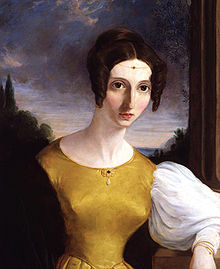Harriet Taylor Mill
Harriet Taylor Mill (born October 8, 1807 in London as Harriet Hardy , † November 3, 1858 in Avignon ) was an English suffragette and author. She was best known for her collaboration and marriage with the philosopher John Stuart Mill . She contributed to the genesis and ideas of his works, although her exact share in research is still controversial.
Life
Harriet Hardy married in 1825 at the age of 18 the eleven years older London businessman John Taylor. She had three children with him: Herbert, (* 1827); Algernon ("Haji"), (* 1830); and Helen ("Lily"), (* 1831). Although Harriet showed her husband close friendship and respect to the last, she soon felt bored of his lack of interest in philosophical and political issues. Through the agency of the Unitarian priest WJ Fox, she met John Stuart Mill in 1830.
Strong feelings quickly developed between the two of them. Though scandalous to Victorian morality, the story of John Taylor was received with remarkable tolerance. John Stuart Mill was a guest at the Taylors' house almost every evening, and John Taylor usually went to his club during this time. Because of the scandal that their relationship represented, as well as the fact that both published extensively on the topic of the position of women in society and in relation to men, research has always been concerned with whether the nature of their relationship is purely "platonic" was or had a physical component. While it is now considered relatively certain that it was a purely “platonic” relationship prior to their marriage, the status after the wedding is not yet certain. However, several statements in her publications suggest that their relationship remained "platonic" until the end.
In 1833 Taylor asked his wife to start her own household. It was only when John Taylor became ill with cancer in 1848 that she moved back in with him and cared for him. During this time there were violent arguments between Harriet and John Stuart, as the latter, in Harriet's opinion, did not care enough about her husband and care.
In 1851, two years after John Taylor's death, the two finally married. They retired to their estate in Blackheath Park, probably also to avoid the gossip stories of the time.
Works and work
The influence of Harriet Taylor on John Stuart Mill's work is unclear. Under her own name she published only a few essays and the work The Enfranchisement of Women . About their influence on the work published under the name of John Stuart Mill, he said in his autobiography : “When two persons have their thoughts and speculations completely in common; when all subjects of intellectual or moral interest are discussed between them in daily life, and probed to much greater depths than are usually or conveniently sounded in writings intended for general readers; when they set out from the same principles, and arrive at their conclusions by processes pursued jointly, it is of little consequence in respect to the question of originality, which of them holds the pen ".
While it contributed little to Mill's more technical works such as the Principles of Logic , it significantly shaped his political and philosophical outlook on the world. She probably had a real co-authorship on the two books Principles of Political Economy (there in particular the chapter on the position of the working class is almost exclusively ascribed to her) and on Mill's most famous work On Liberty . Mill himself said: “The“ Liberty ”was more directly and literally our joint production than anything else which bears my name, for there was not a sentence of it that was not several times gone through by us together, turned over in many ways , and carefully weeded of any faults, either in thought or expression, that we detected in it…. "
Others
The Harriet Taylor Mill Institute for Economics and Gender Studies, founded in 2001 at the Berlin School of Economics and Law, is named after her.
Primary literature
- Harriet Taylor Mill: The Complete Works of . Bloomington: Indiana Univ. Press 1998, ISBN 978-0253333933
- John Stuart Mill, Harriet Taylor Mill, Helen Taylor: The bondage of women. Frankfurt a. M .: Syndicate 1969, ISBN 3-8108-0009-0
Secondary literature
- Friedrich A. Hayek: John Stuart Mill and Harriet Taylor . New York: Kelley 1969
- Jo Ellen Jacobs: The Voice of Harriet Taylor Mill . Bloomington: Indiana Univ. Press 2002, ISBN 978-0253340719
- Ringo Narewski: John Stuart Mill and Harriet Taylor Mill . VS Verlag Wiesbaden 2008, ISBN 3-531-15735-3
Web links
- Harriet Taylor Mill. In: FemBio. Women's biography research (with references and citations).
- Entry in Edward N. Zalta (Ed.): Stanford Encyclopedia of Philosophy . .
- Harriet Taylor Mill Institute of the HWR Berlin
Individual evidence
- ↑ http://www.gutenberg.org/cache/epub/10378/pg10378.html
- ↑ http://www.gutenberg.org/cache/epub/10378/pg10378.html
| personal data | |
|---|---|
| SURNAME | Mill, Harriet Taylor |
| ALTERNATIVE NAMES | Hardy, Harriet |
| BRIEF DESCRIPTION | English suffragette and author |
| DATE OF BIRTH | October 1807 |
| PLACE OF BIRTH | London |
| DATE OF DEATH | November 3, 1858 |
| Place of death | Avignon |

